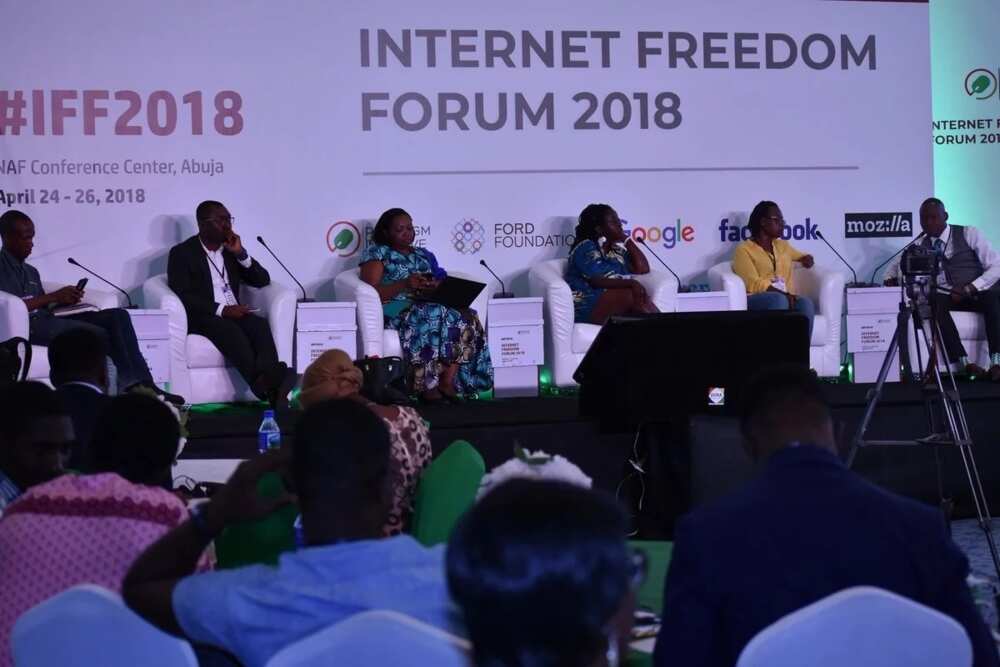IFF 2018: Experts call for replication of Nigeria's Digital Rights Bill in other African countries
- The Internet Freedom Forum 2018 kicked-off in Nigeria's capital, Abuja, on Tuesday, April 24
- Delegates from some 30 countries within Africa and beyond are attending the forum
- Experts at the forum want the Nigeria's Digital Rights Bill replicated in other African countries
Digital rights experts have called for the replication of Nigeria’s Digital Rights and Freedom Bill by other African countries. The bill which was recently passed by the National Assembly was praised by experts as a step in the good direction in strengthening digital rights on the continent.
The experts made this call at the 6th Internet Freedom Forum, an international conference organised by Paradigm Initiative, which is currently taking place at NAF Conference Centre, Abuja.
Speaking at the event, Ephraim Kenyanito of Article 19 East Africa, said: “It would be great if the Nigerian president could immediately sign the bill into law. This would be seen as a challenge to other African countries. It would be great for Nigeria to set a good example in this area.”
According to Adeboye Adegoke, Paradigm Initiative’s digital rights program manager, “The Digital Rights and Freedom Bill was drafted by a coalition of civil society, private sector and government to protect the digital rights of Nigerians in the emerging digital age. The bill is great for the protecting citizens’ rights and also great for the economy as it would energise the tech industry.”

READ ALSO: YIAGA Africa set to partner EFCC on anti-corruption fight
John Edokpolo, Microsoft Nigeria head of legal affairs, called on the government to enact good laws in encouraging innovation and development in the tech industry.
“If you want foreign direct investment in the technology industry, you need to have a good data privacy law, among other things. It helps when businesses can help government see the economic benefits of having positive legislation around digital rights. The job should not be left to the civil society alone,” he said.
The forum also provided an opportunity to discuss the adversarial relationship between government and media in the digital age.
Speaking at the session dedicated to the theme, Henry Maina, regional director of Article 19 Eastern Africa, said: “Nigeria remains one of the many African countries which still retain criminal libel laws, an unfortunate reality that simply erodes freedom.”
Tolu Ogunlesi, special assistant to President Muhammadu Buhari on digital media, said: “An effective media ensures a free society and serves as a check on government. The media should, therefore, avoid engaging in only broadcasting what different actors are saying but go beyond the press statements to finding out the truth.
“The media must do more to combat fake news and ensure truthfulness in their reports. While I would not campaign for government regulation of media space, I would argue for the media to be more accountable and self-regulate.
“I believe the Buhari government has put out more information in the recent history of Nigeria. Obviously, this is not enough, but it is important to acknowledge this. We are deliberately communicating regularly with the public.”
Dapo Olorunyomi, the publisher of Premium Times, said the media was already accountable and it was the government that needed to improve transparency and its proactiveness in releasing information.
READ ALSO: OPINION: Technology and the challenge of election integrity by Samson Itodo
The Internet Freedom Forum also had a session dedicated to discussing the impact of intentional internet disruptions on the economy.
This session, coordinated by the Centre for Intellectual Property and Information Technology Law (CIPIT) at Strathmore University Kenya, analysed the economic impact of internet shutdown on the economies of the countries that have experienced.
Speakers at the session bemoaned the ease with which African countries now resort to internet shutdown without any consideration for its impact on their peoples and economy.
The forum, which runs between Tuesday, April 24 to Thursday, April 26, brings together experts from across some forty countries in Africa and beyond.
Young talented artist paints prominent Nigerians on Legit.ng TV
Source: Legit.ng
